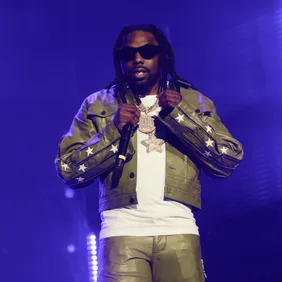Like "Head Honcho" with Shady Records signee Ez Mil posits, "canceled" isn't the word to describe Eminem. That concept drives The Death Of Slim Shady (Coup De Grâce) and is as painfully ancient and obvious as it is subversive. While Marshall Mathers has arguably tried to "kill" Slim Shady since 1999, this new project is unique in how explicitly he connects his biggest demons while showcasing his best long-form quality control in over a decade.
However, that quality control is still bizarre since Eminem throws stuff at the wall and doesn't focus much thematically on most individual tracks, an odd trait for a "concept album." It's a missed opportunity for breakdowns of the rapper's personas and beliefs. Still, the things that make this album great and irate are in Em's whole discography to varying degrees... all that changes is the specific names, like Diddy and Megan Thee Stallion mentions on The Death Of Slim Shady. Slim Shady's "death" here is more of an exorcism of his immortality and is generally an entrancing spell.
What Works On The Death Of Slim Shady?
As for Eminem, his own "immortality" in hip-hop has his technically gifted pen to thank, not his other half. Some Dr. Dre production all over The Death Of Slim Shady (plus Dem Jointz, Em himself, and more) certainly helps, too. But his colorful and zany artistry always stretches thin with vivid, albeit cartoonish approaches. Comically crude, wildly impressive, and deep moments emerge, such as the Amber Heard bar on "Lucifer," the rhyme schemes on "Antichrist," and recollections of Em's daughter Hailie playing guitar on "Somebody Save Me." Then, it's stale shock value, eye-roll wordplay, and melodrama: animal cruelty on "Evil" that went nowhere, that terrible sock puppet bar on "Bad One," and forcedly aggressive cadences on the otherwise soft "Temporary."
Instrumentally, things are much more consistently enjoyable than past efforts like Revival or Kamikaze. The peppy and gritty beat on "Renaissance" and the percussive speed-up on "Habits" are particular highlights. There's an orchestral sense of drama throughout these beats with fitting drum tones, and progressive embellishments make the instrumentals more dynamic. Alas, lyrically and musically, The Death Of Slim Shady's repetition is its kryptonite. Tracks like "Houdini," "Brand New Dance," and the family tribute tracks from the perspective of a dying or deceased Marshall are not-so-subtle retreads of "Without Me," "Just Lose It," and "When I'm Gone," respectively.
Eminem's Artistic Addictions
There are also way too many Caitlyn Jenner, little people, and Gen Z jokes peppered all throughout the album's first leg. Eminem -- or Slim Shady, rather -- tries so hard to offend that it comes off just as performative as how he characterizes the "cancelation" he rallies against. Regardless of how much anyone tries to reiterate that "that's the point," this causes even more whiplash between his typical toilet humor and linguistic creativity. Still, The Death Of Slim Shady's saving grace, "Guilty Conscience 2," contextualizes these aspects compellingly and paints Slim Shady as an addict to controversy due to his upbringing. With his "death" at the end of the song, subsequent tracks suggest what Marshall actually has smoke for, whether Candace Owens' hypocrisy or the state of hip-hop through tracks like "Tobey."
That's not to say that Slim Shady is the problem with The Death Of Slim Shady: "Fuel" is still the best song on this album thanks to two killer verses from Eminem and JID. But these songs present really strange vocal mixing choices ( i.e. "Road Rage") that don't clarify when one personality is talking and when the other retorts. To be fair, it's arguably Em's most ambitious full-length since The Eminem Show, but only one or two moments here really tackle killing Slim rather than parading him around just to suppress him later. Sadly, it doesn't fully translate as growth or evolution.
Will Slim Shady Ever Truly Die?
Above all, The Death Of Slim Shady champions all of our assumptions about Eminem and his alter-ego as explicitly as possible. Very few new topics enter, but a heightened musical consistency makes these repetitions well-flowing and easier to appreciate. His addictions to substances and controversy have never been more intertwined, and neither have these struggles so directly explained his shortcomings as a family man. Yet Mr. Mathers is always passionately committed to his loved ones. In many ways, this "coup de grâce" (in other words, a merciful kill shot) feels like the album that he has tried to make for the past fifteen or so years.
Even with this album's concept of beating a dead horse back to life, we doubt Eminem and Slim Shady are separate. While blasting "cancelations" of either Colin Kaepernick or Dave Chappelle, Em/Slim's biggest issue seems to be how people always need to apologize and criticize rather than tolerate opposing views. That's been a mission statement of his throughout his whole career, and it's ironic that he seemingly can't tolerate that it's a nauseating one. Then again, isn't this the most "Eminem" album perhaps ever, with all his best and worst feats and flaws delivered with a middle finger and a wink? Maybe Slim's addictive controversies are what died in a blaze of glory. But that combative fire will always fuel Marshall Mathers.







